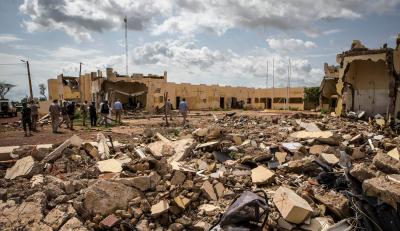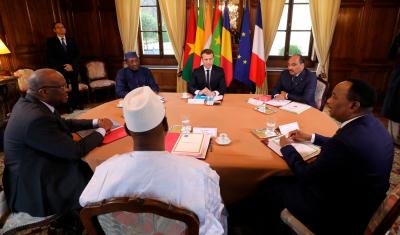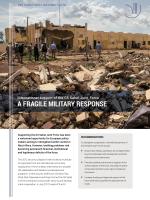A fragile military response

Supporting the G5 Sahel Joint Force has been a welcomed opportunity for European policy-makers aiming to strengthen border control in West Africa. However, teething problems risk becoming permanent financial, institutional and legitimacy deficits of the force.
■ Ensure that military operations are complemented by and coordinated with development activities addressing local grievances.
■ Prioritise political and economic support of the civilian aspects of the force, including the police component and the human rights compliance framework.
■ Increase funding and logistical support of the force while ensuring effective disbursement of funds.
The 2012 security collapse in Mali evoked a multitude of responses from the international community ranging from French military interventions to broader UN stabilisation and Western-led development programs. In this security traffic jam, Burkina Faso, Chad, Mali, Mauretania and Niger formed the G5 Sahel in 2014 to enhance cross-border security and development cooperation. In July 2017, heads of the G5 states, with the support of France, launched a joint force of 5,000 troops, the JF-G5S, to counter terrorism, migration and organised crime in their shared cross-border regions.
Supporting the JF-G5S seemed like an obvious choice for European policy-makers:
First, the JF-G5S initiative represents a broader tendency of seeking ‘African solutions to African problems’ on a continent where Western states are reluctant to deploy troops due to domestic political and budgetary constraints. France has been the most active European member-state in the Sahel in terms of military engagement. Yet after four years of deploying 4,000 soldiers to its counterinsurgency operation, Barkhane, French resources are overstretched, and new partners are needed to complement their fight against terrorism in the Sahara.
Second, tapping into a broader discussion of the UN’s suitability in asymmetrical warfare, the direct counterinsurgency mandate of JF-G5S was a much-requested add-on to the UN stabilisation mission in Mali (MINUSMA) and Operation Barkhane. Since the deployment of more than 13,000 of MINUSMA’s troops in 2013, of which about 35% originate from the G5 states, regional actors have expressed concerns that the UN has not done enough to counter terrorism. As jihadist violence has grown steadily in Mali’s cross-border regions outside the scope of MINUSMA’s mandate, the incentives of neighbouring states to engage in counterinsurgency operations have increased.
The Sahel Joint Force is still far from operational, and it is questionable what the force can actually achieve given the circumstances on the ground
At a time where migration and terrorism continue to be the most important security priorities in Europe, the willingness of the G5 countries to take charge of regional security – and thereby undertaking the difficult task of securing Europe’s borders – might appear as a clear win-win situation for European governments. However, the Sahel Joint Force is still far from operational, and it is questionable what the force can actually achieve given the circumstances on the ground.
An overambitious mandate and limited capabilities
Initially, the mandate of the force was exceptionally ambitious: it included fighting terrorism, organised crime and human trafficking; restoring state authority; assisting displaced people to return; contributing to humanitarian operations; and assisting with the implementation of development projects. Though the G5 states often emphasise development as necessary for security, European countries have pushed the group towards a strict focus on security cooperation. In the current phase, the force has prioritised counter-terrorism tasks, though with little success so far despite the support of French and US counterinsurgency operations. This is not least due to the ability of the jihadist groups to disperse into remote rural areas largely abandoned by the state.
While increased border control is often the immediate policy response to terrorism and illicit cross-border activities, addressing these challenges requires first and foremost trust and collaboration with local communities. For instance, illicit cross-border trade constitutes an indispensable source of income for impoverished populations in remote cross-border regions. By disrupting these activities without presenting viable alternatives, the force risks turning already distrustful populations against them. In this context, military responses cannot stand alone. They need to be coordinated with development activities addressing long-standing grievances of local populations in terms of poverty, injustice and absence of basic social infrastructure.
To win the confidence of the people, the armed forces need to understand that they have to protect them and collaborate with them – otherwise they will lose them.
The Malian army still suffers from a chronic deficit in troops and resources which was visible during the crisis in 2012, with genuine security sector reform still lagging behind. Continuous abuses and arbitrary arrests by the armed forces of the G5 have been widely reported.
In May 2018, a Malian soldier deploying under the JF-G5S framework opened fire after being attacked at a market in Boulkessi and at least 12 civilians were killed. Such incidents have deteriorated the hard-tried legitimacy of the force. Several observers point to abuse by security forces as a major reason for people joining the jihadist militant groups, which sheds light on the potential long-term destabilising effects of supporting dysfunctional armed forces in states that Europe increasingly depend on to curb migration, terrorism and organised crime.
To monitor military units and their compliance with international law, a human rights compliance framework has been developed in partnership with the G5 states, the UN and the EU. Furthermore, a police and civilian component has been developed with support from UNODC, which includes, amongst other tasks, monitoring military units, training in human rights and the rule of law as well as the investigation of human rights violations. But the deployment of the police component and the full implementation of the human rights framework require sustained financial and political commitment by the JF-G5S’s international partners.
Insecure financial and human resources
The issue of funding touches upon another core challenge: the financial and human resource deficit of G5 Sahel national armies. Niger, Mali and Burkina Faso are all among the world’s poorest countries and their national defence capacities are overstretched. Niger, for instance, has quadrupled its military expenditure to tackle the terrorist organisation Boko Haram while managing spill over from increasing instability in Libya and trying to secure its borders with Mali.

In June 2017, the US and the UK balked at France’s proposal to the UN Security Council to give the JF-G5S a chapter VII authorisation, which would have authorised the use of force and secured financial contributions in the Security Council Resolution. Consequently, the force now depends entirely on individual pledges and donations. Though donor pledges nearly met the initial budget of 423 million euros, disbursements have been delayed, and the question of funding operational costs has not been solved. With the plurality of donor support and financing mechanisms, matching donors’ offers with a Recognised List of Needs has been coordinated by the EU, but at the time of writing the issue of disbursement is still causing delays in training and the delivery of equipment.
Finally, troop deployment to the force has been slow. While MINUSMA is now authorised to provide logistical support to the JF-G5S, neither additional troop generation nor transfer of MINUSMA contingents to the force are on the table. Niger, Burkina Faso and Chad deploy 850, 1,700 and 1,400 troops to MINUSMA respectively.
Being the UN’s deadliest mission, contingents from these countries have carried some of the highest death tolls. This is particularly due to the fact that the African forces are pushed to take on more dangerous tasks in areas where no other contingents are willing to be deployed, while having received limited training, inadequate equipment and poor logistical support. Since its inception, MINUSMA, overstretched in covering Mali’s territory of almost twice the size of France, has been lacking armoured vehicles and adequate aerial support and troops. Furthermore, MINUSMA spends 80% of its resources on force protection, making it questionable whether it can support yet another force. Deploying troops in an asymmetrical threat environment without adequate support, training, equipment and vehicles is likely to make soldiers more prone to misconduct.
In other words, for the JF-G5S to become operational, its international partners must increase sustained financial and logistical support while ensuring that accountability mechanisms and human rights frameworks are adequately developed and implemented. However, even if operational, the JF-G5S alone cannot solve the root causes of long-standing security challenges deeply embedded in historical conflict dynamics and aggravated local grievances. This would require the G5 states and their partners prioritise human security and targeted development activities in remote and neglected cross-border regions.
DIIS Experts



